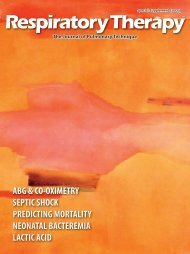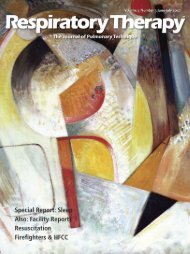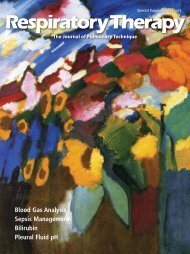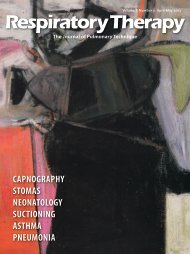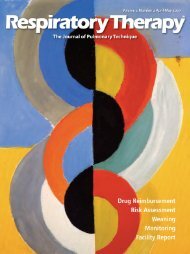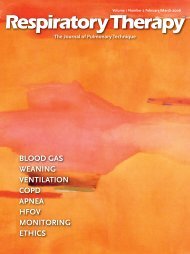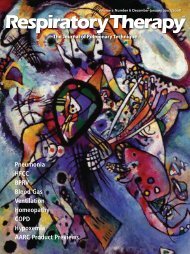RT 02-03 JJ07 main web - Respiratory Therapy Website
RT 02-03 JJ07 main web - Respiratory Therapy Website
RT 02-03 JJ07 main web - Respiratory Therapy Website
You also want an ePaper? Increase the reach of your titles
YUMPU automatically turns print PDFs into web optimized ePapers that Google loves.
Published six times each year by<br />
Goldstein and Associates, Inc.<br />
10940 Wilshire Blvd.,Suite 600<br />
Los Angeles, CA 90<strong>02</strong>4 USA<br />
Tel: 310-443-4109<br />
Fax: 310-443-4110<br />
E-mail: s.gold4@verizon.net<br />
<strong>Website</strong>: www.respiratorytherapy.ca<br />
Publisher<br />
Steve Goldstein<br />
Editor<br />
Les Plesko<br />
Senior Editor<br />
Carol Brass<br />
Assistant Editor<br />
Laszlo Sandor<br />
Design and Production<br />
Management<br />
http://accugraphics.net<br />
Circulation, Coverage, Advertising Rates: Complete details<br />
regarding circulation, coverage, advertising rates, space sizes, and similar<br />
information are available to prospective advertisers. Closing date is 45<br />
days preceding date of issue.<br />
Change of Address notices should be sent promptly to Circulation<br />
Department. Provide old mailing label as well as new address. Allow two<br />
months for change.<br />
Editorial Contributions will be handled with reasonable care.<br />
However, publishers assume no responsibility for the safety of artwork,<br />
photographs or manuscripts. A hardcopy of all contributions may be<br />
mailed or faxed to our editorial offices. E-mail submissions will be<br />
accepted. Every precaution is taken to ensure accuracy, but the publishers<br />
cannot accept responsibility for the correctness or accuracy of information<br />
supplied herein or for any opinion expressed. Editorial closing date is the<br />
first day of the month preceding month of issue.<br />
©2007 by Goldstein & Associates, Inc. All rights reserved. Reproduction in<br />
whole or in part without written permission is strictly prohibited.<br />
public are prepared to accept, how the burdens of negative<br />
outcomes should be distributed across the population and<br />
whether or not more resources should be invested.<br />
One of the key lessons from the Toronto SARS experience was<br />
that healthcare institutions and their staff could benefit from the<br />
development of ethical frameworks for decision-making. Not<br />
surprisingly, the literature on clinical ethics has little to say<br />
about disaster preparedness and how to make decisions about<br />
such things as triage under extraordinary circumstances. The<br />
ethics literature on bioterrorism and battle-field triage can<br />
inform thinking and call attention to important issues such as<br />
the duty to care, reciprocity, equity and good stewardship. The<br />
ethical framework should be intended to inform decisionmaking,<br />
not replace it. It is intended to encourage reflection on<br />
important values, discussion and review of ethical concerns<br />
arising from a public health crisis. It is intended also as a means<br />
to improve accountability for decision-making and may require<br />
revision as feedback and circumstances require.<br />
In planning for and throughout a pandemic influenza crisis,<br />
difficult decisions will be made that are fraught with ethical<br />
challenges. Stakeholders will be more able to accept difficult<br />
decisions during a pandemic influenza crisis if the decisionmaking<br />
process has, and is perceived to have, ethical legitimacy.<br />
Factors that need to be decided on the basis of ethical<br />
requirements are: a) targeting and prioritizing populations for<br />
vaccines and antivirals; b) Intensive Care Unit and hospital bed<br />
assignment; c) duty to care; d) human resources allocation and<br />
staffing; e) visiting restrictions; and f) communications and how<br />
Russel A. Acevedo, MD, FAARC, FACP,<br />
FCCM, FCCP<br />
Medical Director,<br />
<strong>Respiratory</strong> Care Department<br />
Crouse Hospital, Syracuse, NY<br />
Mohammed Al Ahmari, BS<strong>RT</strong>, MSc., R<strong>RT</strong><br />
Prince Sultan Military College<br />
of Health Sciences<br />
Al-Khobar, Saudi Arabia<br />
Antonio Esquinas, MD, PhD, FCCP<br />
Intensive Care Unit<br />
Hospital Morales Meseguer<br />
Murcia, Spain<br />
Larry Conway, R<strong>RT</strong><br />
North Mississippi Medical Center<br />
Tupelo, MS<br />
Edwin Coombs, MA, R<strong>RT</strong><br />
Product Manager,<br />
Critical Care Division<br />
Maquet, Inc.<br />
Bridgewater, NJ<br />
Dr. Javier Fernandez<br />
Director of Clinical Affairs & Education<br />
<strong>Respiratory</strong> Division Latin America<br />
Miami, FL<br />
Gerardo N. Ferrero, PT<br />
Clinical Specialist, Latin America<br />
Buenos Aires, Argentina<br />
Editorial Advisory Board<br />
Surinder K. Jindal, MD<br />
Postgraduate Institute of Medical<br />
Education & Research<br />
Chandigarh, India<br />
Rebecca A. Mabry<br />
General Sleep Manager<br />
Viasys Healthcare, Yorba Linda, CA<br />
Paul Mathews, PhD, R<strong>RT</strong>, FCCM,<br />
FCCP, FAARC<br />
Associate Professor, <strong>Respiratory</strong> Care<br />
University of Kansas Medical Center<br />
Kansas City, KS<br />
Hossein Razavi, MD, FCCP<br />
Pulmonary, Critical Care &<br />
Sleep Medicine<br />
St. Helena, CA<br />
Daniel D. Rowley, BS, R<strong>RT</strong>-NPS, RPFT<br />
Surgical/Trauma/Burn ICU<br />
University of Virginia Medical Center<br />
Charlottesville, VA<br />
J. Kyle Schwab, MD<br />
Medical Director<br />
Louisiana Sleep Foundation<br />
Baton Rouge, LA<br />
reviews of decisions will be handled. For 10 specific ethical<br />
values, see the table on the next page.<br />
Some may argue that the values in the framework are too<br />
stringent or impractical to implement under crisis conditions.<br />
Certainly, crisis conditions may place constraints on the extent<br />
to which each principle can be acted upon. However, efforts<br />
should be made to put them into action to the fullest extent<br />
possible under the circumstances.<br />
The above is excerpted and edited from the article “Pandemic<br />
influenza preparedness: an ethical framework to guide decisionmaking,”<br />
BMC Medical Ethics, © 2006 Thompson et al; licensee<br />
BioMed Central Ltd. The paper is an Open Access article<br />
distributed under the terms of the Creative Commons<br />
Attribution License. For the full article please go to the <strong>web</strong>site<br />
BioMed Central, and type in the name of the article. A look at<br />
the Toronto SARS experience can be found in this journal, Vol 1<br />
No 3, page 41.<br />
8 <strong>Respiratory</strong> <strong>Therapy</strong> Vol. 2 No. 3 � June-July 2007




